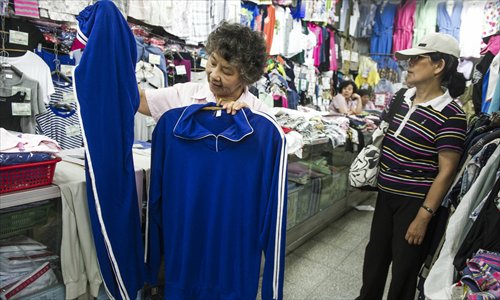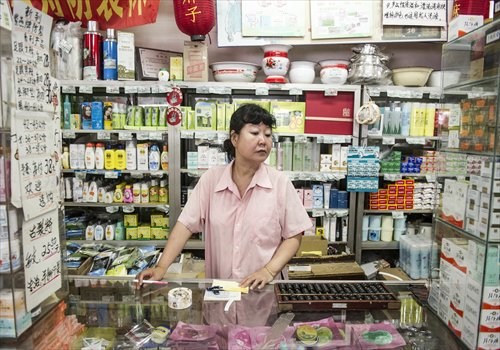

Xue Hong, manager of the Dafang Grocery in Qianmen, Dongcheng district, shows off a tracksuit from the 1980s. Photo: Li Hao/GT

State-owned businesses such as the Xincheng Noodle House and Dafang Grocery in Beijing ooze vintage appeal by featuring the same decoration, products and even staff for decades. Despite having a loyal following of aging customers, the businesses face an uncertain future due to difficulties attracting young employees and customers. Photos: Li Hao/GT
Most days at around noon, antique appraiser Zhang Jinhu takes a leisurely stroll down centuries-old shopping street Qianmen Dajie to get lunch. A native of the capital, the 64-year-old has been a loyal diner at the Xincheng Noodle House for most of his life.
"This place has a history dating back more than 50 years," Zhang explained of the restaurant famed for its sliced noodles and traditional Beijing snacks. When Zhang enters the guoying, or State-run, restaurant, staff know to prepare "the usual" for him: boiled peanuts with pork jelly, a plate of dumplings and a small cup of Erguotou baijiu.
Inflation over the past 58 years has resulted in the price of peanuts and pork jelly rising from 6 jiao to 5 yuan ($0.09-$0.80), but prices are about the only thing to have changed at the restaurant over time.
It still has its old-fashioned counter, handwritten menu in red ink on yellow paper and simple, earthen tablewares.
There is no computer or cash register at the counter. Instead, wait staff simply tally bills using an abacus and deposit customers' money into an old wooden box.
The term "State-owned" in China often brings to mind major enterprises involved in finance, energy, telecommunications or other behemoth industries that employ tens of thousands and post multimillion yuan profits each year.
But in the shadow of these giants is a dwindling number of small businesses that provide simple service and hospitality from yesteryear.
Noodles with nostalgia
Since it opened in 1956 as a joint venture between the government and private owners, the Xincheng Noodle House has been a mainstay in Qianmen where many historic buildings have been razed in recent years as part of the street's modernization.
Li Guorong, 58, one of the restaurant's owners, has worked there since 1976. A few years after she joined, the restaurant, located on Liangshidian Jie, a small street just off Qianmen Dajie, was entirely nationalized.
"In the 1980s, there were no private restaurants. There were only three State-owned restaurants, and our business flourished," said Li.
When reforms were made to develop a market economy in the 1990s, competition intensified on Liangshidian Jie as new private restaurants muscled in. Local State-owned restaurants were either privatized or closed. Today, the Xincheng Noodle House is the sole surviving State-owned restaurant in the street.
"I know we are behind the times, but this is a job for life for us. We never thought about giving up," said Li. "Now, we have embraced a kind of fashionable, vintage appeal that attracts not only elderly people, but also youngsters from the post-1980s generation."
Falling out of vogue
Restaurants aren't the only businesses from bygone eras that offer customers a trip down memory lane in Beijing. The State-owned Dafang Grocery, which opened in 1979 on Qianmen Dongdajie, is still well-known to locals, particularly those who buy its domestic cosmetics.
Wang Qing has worked at Dafang's cosmetics counter since 1988. At 47, she is the youngest employee at the store. "We have not changed, both in terms of our store's decoration and the cosmetics we sell," said Wang. "I have been given insight into many customers' lives. I've seen children grow into adults, and young adults become elderly and retired."
Dafang was a trendy place to shop in the 1980s, long before the rise of Xidan and Sanlitun as commercial hubs. Back then the store used to sell products hard to find elsewhere in Beijing, such as embroidered clothes, ski suits, Middle Eastern-style tapestries and even sleeping bags.
"During the 1980s, round-bottom shirts were quite rare and we were the only store to sell them in Beijing," said Xue Hong, manager of Dafang. "Our store was one of the favorite shopping places of diplomats for clothes and cosmetics."
Struggle for survival
In the wake of store's glory days, Xue can't help but feel sad when reflecting on Dafang's decline from fashion hot spot to quiet, vintage store. With limited funds, the store is unable to purchase high-end, fashionable goods from new suppliers.
Although Dafang has a steady flow of nostalgic and curious customers, the store's future is uncertain due partly to its trouble recruiting young staff.
"We are 'grandma' business," joked Xue. "We currently have 29 workers aged 47 to 64, all who have been with us since our first day. Even if we matched the salaries offered by big modern shopping malls, young people would still prefer to work there than with us."
Not far away at the Xincheng Noodle House, Li also has a grim outlook for the future of her restaurant. Besides difficulties recruiting new staff, she worries about getting priced out of the market.
"Our building belongs to a landlord. In the 1970s, our monthly rent was only 36 yuan. It is more than 10,000 yuan today, but that is still quite cheap compared with other places due to our decades-long partnership," said Li.
For diners like Zhang, the day might soon come when he must find another restaurant to order boiled peanuts, pork jelly and dumplings washed down with Erguotou.
"I'm afraid sooner of later the landlord will end our lease and we will have no choice but to close down," Li said.
Copyright ©1999-2018
Chinanews.com. All rights reserved.
Reproduction in whole or in part without permission is prohibited.